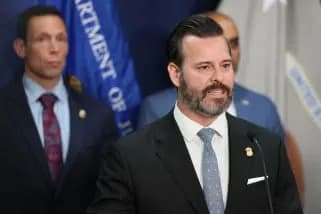After President Trump took control of D.C. policing and deployed the National Guard in August 2025, federal authorities made sweeping arrests intended to address a declared "crime emergency," a claim many dispute. Skeptical grand juries in Washington and Los Angeles have repeatedly declined to return indictments in several high-profile cases, including those of Sydney Reid and Sean Dunn. Such non-indictments are rare historically and have prompted questions about prosecutorial overreach and the grand jury's role as a check on federal power.
When Grand Juries Say No: D.C. and L.A. Push Back Against Aggressive Federal Prosecutions

When Grand Juries Say No: D.C. and L.A. Push Back Against Aggressive Federal Prosecutions
August 2025: President Donald Trump assumed direct control of Washington, D.C.'s police and ordered the National Guard deployed throughout the city, calling the district's situation a "crime emergency"—a description many observers disputed. While violent crime remains a concern in the capital, the homicide rate has fallen over the previous two years and is far below its 1990s peak.
Federal agents conducted large-scale arrests in the city, and Mr. Trump signaled he might expand similar operations to other U.S. cities. Those moves prompted widespread worry about potential threats to civil liberties. But one unexpected check on aggressive prosecutions has emerged: skeptical grand juries that have repeatedly declined to return indictments in several notable federal cases.
How grand juries usually work
The Fifth Amendment states, with few exceptions, that "No person shall be held to answer for a capital, or otherwise infamous crime, unless on a presentment or indictment of a Grand Jury." In practice, grand juries almost always return indictments. Proceedings are nonadversarial: prosecutors present evidence without an opposing lawyer, and the standard to secure an indictment is far lower than the burden of proof required for conviction at trial. That discrepancy inspired the old quip that a prosecutor could indict a ham sandwich.
Cases that illustrate the pushback
Sydney Reid. In July 2025 Reid filmed D.C. police transferring two men to Immigration and Customs Enforcement (ICE). According to charging documents, she positioned herself between officers and the detainees after being told to step back; an ICE officer allegedly pushed her against a wall. Prosecutors said an FBI agent intervened and suffered hand injuries from striking a cement wall. Reid was arrested on a federal felony charge of "assaulting, resisting, or impeding" a federal officer—an offense carrying up to eight years in prison. ICE posted on social media: "Assault an officer or agent—get arrested. It's not rocket science."
When the U.S. attorney's office presented the case to a grand jury, jurors declined to indict not once but three separate times. After prosecutors failed to secure an indictment within 30 days as required by law, they ultimately reduced the charge and filed a misdemeanor instead. Prosecutors failing even once to obtain an indictment is rare—DOJ data show only six non-indictments among more than 130,000 prosecutions in 2016—so three refusals in the same matter is extraordinary.
Sean Dunn. In August, DOJ employee Sean Dunn threw a sandwich at a federal officer while protesting federal agents in D.C. He was briefly chased, arrested, booked, and released; Dunn offered to surrender voluntarily for arraignment, but authorities later sent 20 officers in riot gear to his apartment to rearrest him on the same charge. The White House posted video of the operation online, and Attorney General Pam Bondi publicly criticized the episode. Yet a grand jury declined to return an indictment in that case as well.
Los Angeles. Grand juries have pushed back outside the capital too. In Los Angeles, acting U.S. Attorney Bill Essayli charged 38 people with felonies relating to protests and immigration raids in June. Grand juries returned indictments in just seven of those matters; three additional cases resolved by plea deals. Prosecutors dismissed five cases and refiled nine as misdemeanors. The Los Angeles Times quoted legal experts saying Essayli's record "raised concerns about the strength of the cases he is filing." Defense attorneys contend some prosecutions rested on faulty officer accounts, while others argue grand juries are rightly policing prosecutorial overreach.
What this means
These refusals to indict — rare in recent federal practice — highlight grand juries' potential role as a check on prosecutors who bring aggressive federal felony charges in politically charged circumstances. Whether grand juries are correcting weak or overstated cases, or reflecting jurors' unease with broad federal criminalization of protest-related conduct, the pattern has already reshaped how some cases are being handled in D.C. and Los Angeles.
Bottom line: Unusually frequent grand jury non-indictments have emerged as a restraining force on aggressive federal prosecutions in 2025, prompting renewed attention to the grand jury's role in the American justice system.
Help us improve.




























